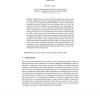Free Online Productivity Tools
i2Speak
i2Symbol
i2OCR
iTex2Img
iWeb2Print
iWeb2Shot
i2Type
iPdf2Split
iPdf2Merge
i2Bopomofo
i2Arabic
i2Style
i2Image
i2PDF
iLatex2Rtf
Sci2ools
116
click to vote
MIDDLEWARE
2005
Springer
2005
Springer
An Optimal Overlay Topology for Routing Peer-to-Peer Searches
Unstructured peer-to-peer networks are frequently used as the overlay in various middleware toolkits for emerging applications, from content discovery to query result caching to distributed collaboration. Often it is assumed that unstructured networks will form a power-law topology; however, a power-law structure is not the best topology for an unstructured network. In this paper, we introduce the square-root topology, and show that this topology significantly improves routing performance compared to power-law networks. In the square-root topology, the degree of a peer is proportional to the square root of the popularity of the content at the peer. Our analysis shows that this topology is optimal for random walk searches. We also present simulation results to demonstrate that the square-root topology is better, by up to a factor of two, than a power-law topology for other types of search techniques besides random walks. We then describe a decentralized algorithm for forming a square-r...
Related Content
| Added | 28 Jun 2010 |
| Updated | 28 Jun 2010 |
| Type | Conference |
| Year | 2005 |
| Where | MIDDLEWARE |
| Authors | Brian F. Cooper |
Comments (0)

